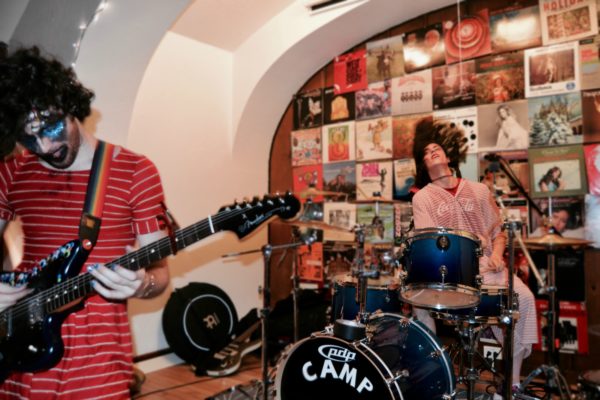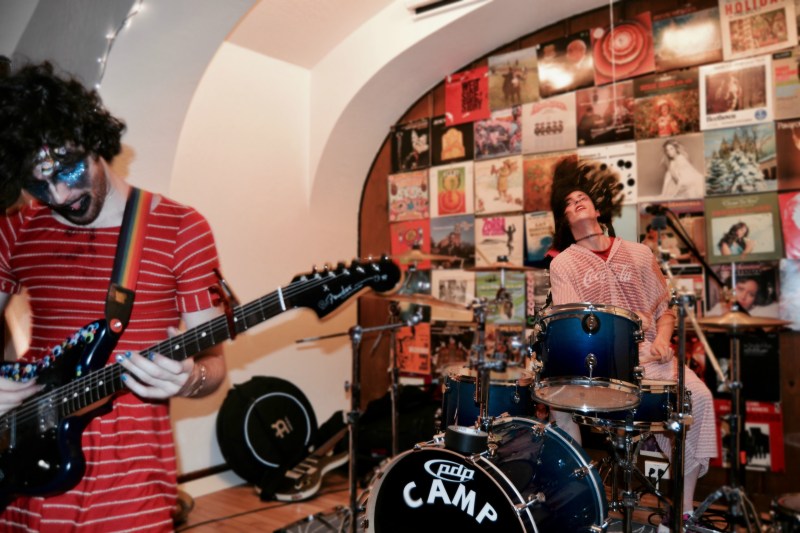
Friday night at Kairos ended with PWR BTTM’s lead guitarist, Ben Hopkins, leading the audience in a poem/musical incantation designed to kill fascists. The goal, according to Hopkins, was to chant it so loud that “Donald Trump fucking dies.” They did not quite achieve their goal, but not for lack of trying.
Roughly two and half hours earlier, the evening began as a far more conventional — but no less tuneful — affair, with an opening set from Stanford regulars Camp Youth. The group, whom you probably heard last while otherwise occupied at Full Moon on the Quad, played a rambling, friendly set in their omnivorous style of dance rock, indebted to not just modern guitar groups like Sleater-Kinney and Foals but also vast swathes of musical history, from ‘50s rock ‘n’ roll balladry to ‘70s funk and soul. While all four members present contributed their fair share to the band’s overall sound, the dazzling lead lines played by guitarist Jenna Swartz ‘17 and the fluid grooves of bassist Dan Ruprecht ‘17 interlocked to form the core of their sound. Swartz, who also sang lead vocals, provided some light stage banter in between Camp Youth’s expansive medleys, mainly asking the audience to dance. We generally accepted her invitation.
But if the 100-odd people packed into Kairos appreciated Camp Youth, they were enraptured by PWR BTTM, the headliners for the evening. The queer punk duo from New York City (founded at Bard College in 2013) have been something of a sensation in the worlds of indie rock and queer-friendly music since the release of their 2015 debut “Ugly Cherries,” which received critical acclaim for its mix of punk energy and witty, earnest lyrics that split the difference between the deeply personal and the anthemic with their devotion to portraying the queer experiences of Hopkins and drummer Liv Bruce.
Yet PWR BTTM is an even more magnetic force live than on record, as their Friday set quickly demonstrated. PWR BTTM was loud, and not just in the way that shows in small rooms with large speakers tend to be. Their sound is based on loudness, on openness, on shamelessness. From the blast of feedback that heralded the beginning of their set onwards, Hopkins and Bruce seemed possessed with an unflagging energy and positivity. That energy was infectious – on songs like “Ugly Cherries,” “Dairy Queen” and especially “I Wanna Boi,” it felt as if the whole room was singing along.
Even in those impromptu communities, though, Ben and Liv had a masterful control over their performance and the crowd. Despite their intentionally unpolished sound, both members are skilled musicians, with Ben playing dazzling, tapping-based guitar riffs indebted to metal and hard rock and Liv holding the group down with their steady punk beats. This stylistic divide held true even in their songwriting and vocal techniques, with Ben leaning into more bombastic lyrics and Liv using a wry, irreverent tone. In between songs, they bantered casually between themselves and with the audience, going on tangents about tarot readings, whiskey, Family Weekend and the nature of punk rock.
It was on that last detour that PWR BTTM gave a mission statement of sorts. To the band, punk rock is fundamentally about radical kindness and optimism, aiming to create spontaneous connections and families of people who feel alienated from mainstream society in whatever way. A PWR BTTM show is an inclusive space because of its punk-ness, and is punk because of its inclusivity. Part of PWR BTTM’s project — beyond just making music — is tearing down the power structures that exist within alternative music scenes. At the start of the show, Ben told the crowd that this was not a show to mosh at, disdaining the practice as an excuse for “people to hurt other people,” and throughout the evening, both members checked in with the audience to make sure that no one was in an unsafe situation.
In the wake of the election, much has been said (including in my own prior columns) about the place of protest music in this political climate. PWR BTTM, more than any other band, seems to have risen to the occasion, both in their music and their mission. Where their first album was deeply personal in its lyricism, PWR BTTM’s upcoming sophomore album, “Pageant,” out May 12 on Polyvinyl records, appears to be aiming for grander political statements. While they only played a few tracks from that release on Friday, two of the four they did play (“Big Beautiful Day” and “New Trick”) were directly political and anthemic in a way that the songs on “Ugly Cherries” rarely were. Yet it was a less explicitly political new song that ended up encapsulating the ethos of PWR BTTM. “Silly,” the opening song of “Pageant,” sounds like the glorious bastard child of Van Halen and Joni Mitchell, with a propulsive tapping riff that runs through nearly the entire song like wildfire and lyrics about embracing your “silliness” and loving in full, committing fully to yourself without caring about what anyone else thinks. It’s a rallying cry for people in an age of repression.
So anyways, about that musical incantation. It doesn’t look as if it worked — as of Thursday morning, the president has not died due to punk-related (or any other) causes. Yet as that room came together to declare that “One man won’t ever love me like I need him to,” the collective spirit that manifested, even for just a few minutes, felt more powerful than anything else in the world.
Contact Jacob Kuppermann at jkupperm ‘at’ stanford.edu.
